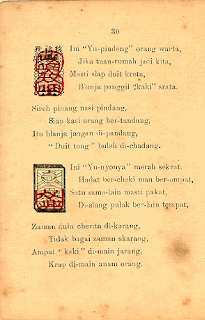Did you know that Baba Malay is regarded as the highest class of Bahasa Melayu or Malay Language at a certain period in the past?
"Those Malay who live in town and all those who constantly have intercourse with the public speak the Baba Malay when communicating with the people in town. It should be understood that the Baba's Malay is not as some think 'a vulgar tongue'. The highest class of Malay when holding conversations with the Baba always speak as the latter do."
-Lim (1887)-
Lim, H.S. 1887. A Manual of the Malay Colloquial such as is Spoken by All Nationalities in the Colonies of the Straits Settlements, and Designed for Domestic and Business Purposes. Singapore: Koh Yeu Hean Press.
The Peranakan language has changed and evolved with their environment much like the weddings they conducted and their display of their unique culture. The use of language is important when speaking in a marriage and having a fusion of language with different dialects and races may be confusing or so we thought.
(Photo Taken From http://sparklette.net/archives/739/baba-malay-new-testament.jpg and website http://sparklette.net/travel/singapore/peranakan-museum/)
(Photo Taken From http://www.sabrizain.org/malaya/Cheki3.gif and website http://www.sabrizain.org/malaya/cheki.htm)
As you can see from this read, the Baba Malay is used among the majority Peranakans throughout Southeast Asia and along the Straits Settlements like Singapore, Malacca and Penang. That read also shows us how the language involves mixes between different language and dialects through comparisons between Baba Malay, Hokkien and Malay.
Other than marriages, language also play a form of entertainment with game books written using Baba Malay and it was used in a card game called Cheki and is played by the Peranakans of Malacca.
There are also other perspectives on Peranakan origins and culture and how that entails into how the Peranakans structure their weddings. The links to the websites are indicated
For further read on the above items, here they are:
(A Travel Singapore Review on the Peranakan Museum. Worth a read!)
(A short review on the Baba Malay Game Book.)
References:
Ansaldo, U., Lim, L., & S. Mufwene, S. The sociolinguistic history of the peranakans. (pp. 203-226). Retrieved from http://www.linguistics.hku.hk/sta/uansaldo/papers/AnsaldoLim&Mufwene.pdf





